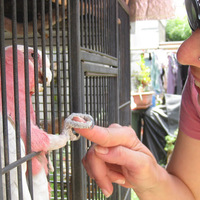Ivana Prazic
Universiti Pendidikan Sultan Idris, History, Faculty Member
- Ivana Pražić earned her BA degree in Art History from the University in Belgrade (Serbia) and her MA degree in the sa... moreIvana Pražić earned her BA degree in Art History from the University in Belgrade (Serbia) and her MA degree in the same field from the Bangalore University (India). Her Ph.D. degree, in turn, she earned from the University of Sydney's Department of Indonesian Studies (Australia). In her works Ivana’s deployed critical race theory to the study of epistemic Sinophobia within area studies or whiteness in Serbian feminist circles and regards herself a decolonial historian. Ivana's a truly international scholar, both by her academic training spanning various educational traditions and her writings, which have been published in various formats and languages across the globe. Currently, she is working on decolonial histories of migration and settlement in the region of South China Sea and Confucianism in the Straits of Malacca.edit
Research Interests:
Book Review of <em>Australia's New Migrants. International Students' History of Affective Encounters with the Border</em>, by Maria Elena Indelicato. London and New York: Routledge, 2018.
Research Interests:
Research Interests:
Research Interests:
Research Interests: Sociology, Area Studies, Intercultural Communication, Australian Studies, Cultural Theory, and 15 moreInternational Education, Cold War, Critical Race Theory, Race and Ethnicity, Racism, International Students, Critical Race Theory and Whiteness theory, Decolonisation, Orientalism, Internationalization of higher education, Cold War Studies, Anti racism, Historical Studies, Integrated Anti racism, and Colombo Plan
Artikel ini bertujuan untuk mengeksplorasi fenomena haji yang dipahami sebagai perjalanan spiritual dan sekaligus bistotis dan sosial, terkait dengan pengalaman individu, framework Muslimah feminis, serta konteks historis dan sosial... more
Artikel ini bertujuan untuk mengeksplorasi fenomena haji yang dipahami sebagai perjalanan spiritual dan sekaligus bistotis dan sosial, terkait dengan pengalaman individu, framework Muslimah feminis, serta konteks historis dan sosial kontemporer dimana perempuan-petempuaiv yang menjadi responden ini hidup dan bekerja, yaitu di tengah masyarakat Indonesia. Artikel berupaya menggali pengalaman spiritual sebagai sesuatu yang terstruktur secata sosial maupun metafor dalam memori tiga perempuan, yang dipilih penulis untuk menjadi responden, yang melakukan perjalanan ke Tanah suci Makkah. Penulis mencoba menciptakan bentuk tulisan yang mempertemukan dan mengaburkan batas antara cerita tentang sebuah perjalanan, penyuguhan cetua, dan penulisan akademis, sehingga diharapkan dapat terhindar dari problem penjajahan penulis terhadap wacana. Pendekatan yang digunakan dalam tulisan adalah pendekatan yang dapat menempatkan cetua tentangperjalanan haji tersebut menjadi sebuahfenomena historis dan p...
Research Interests:
Research Interests:
Research Interests:
This book chapter summarises the results of my MA thesis exploring the iconography and the study of the Buddhist art of Gandhara.
"Indelicato approaches the study of international students in Australia as subjects of both educational and migration policies, who have traditionally been depicted as “emotionally distressed subjects” (2). Hers is a Foucauldian quest of... more
"Indelicato approaches the study of international students
in Australia as subjects of both educational and
migration policies, who have traditionally been depicted
as “emotionally distressed subjects” (2). Hers is a Foucauldian
quest of the historical ways in which the feelings
of international students were deployed as a means
to construe them as simultaneously belonging to sovereign
post-colonies while being treated as prospective
national subjects, i.e. migrants, within Australia as their
educational host."
in Australia as subjects of both educational and
migration policies, who have traditionally been depicted
as “emotionally distressed subjects” (2). Hers is a Foucauldian
quest of the historical ways in which the feelings
of international students were deployed as a means
to construe them as simultaneously belonging to sovereign
post-colonies while being treated as prospective
national subjects, i.e. migrants, within Australia as their
educational host."
Research Interests:
Ana Vilenica (ed.) Why a Lexicon? (excerpt) "The authors in this volume offer multiple perspectives on how to navigate Eastern Europe by thinking through the intersecting interpretations of coloniality and... more
Ana Vilenica (ed.) Why a Lexicon? (excerpt)
"The authors in this volume offer multiple perspectives on how to navigate Eastern Europe by thinking through the intersecting interpretations of coloniality and imperialism, as well as their effects on anti-colonial, decolonial struggles andforms of contemporary solidarities and forms of life. The decolonial frameworks offered by the contributors to this volume make room for anti-capitalist, post-colonial and decolonial discourse. They work with particular localized issues, but do not shy away from difficulties in moving through and engaging with the region."
"The authors in this volume offer multiple perspectives on how to navigate Eastern Europe by thinking through the intersecting interpretations of coloniality and imperialism, as well as their effects on anti-colonial, decolonial struggles andforms of contemporary solidarities and forms of life. The decolonial frameworks offered by the contributors to this volume make room for anti-capitalist, post-colonial and decolonial discourse. They work with particular localized issues, but do not shy away from difficulties in moving through and engaging with the region."
